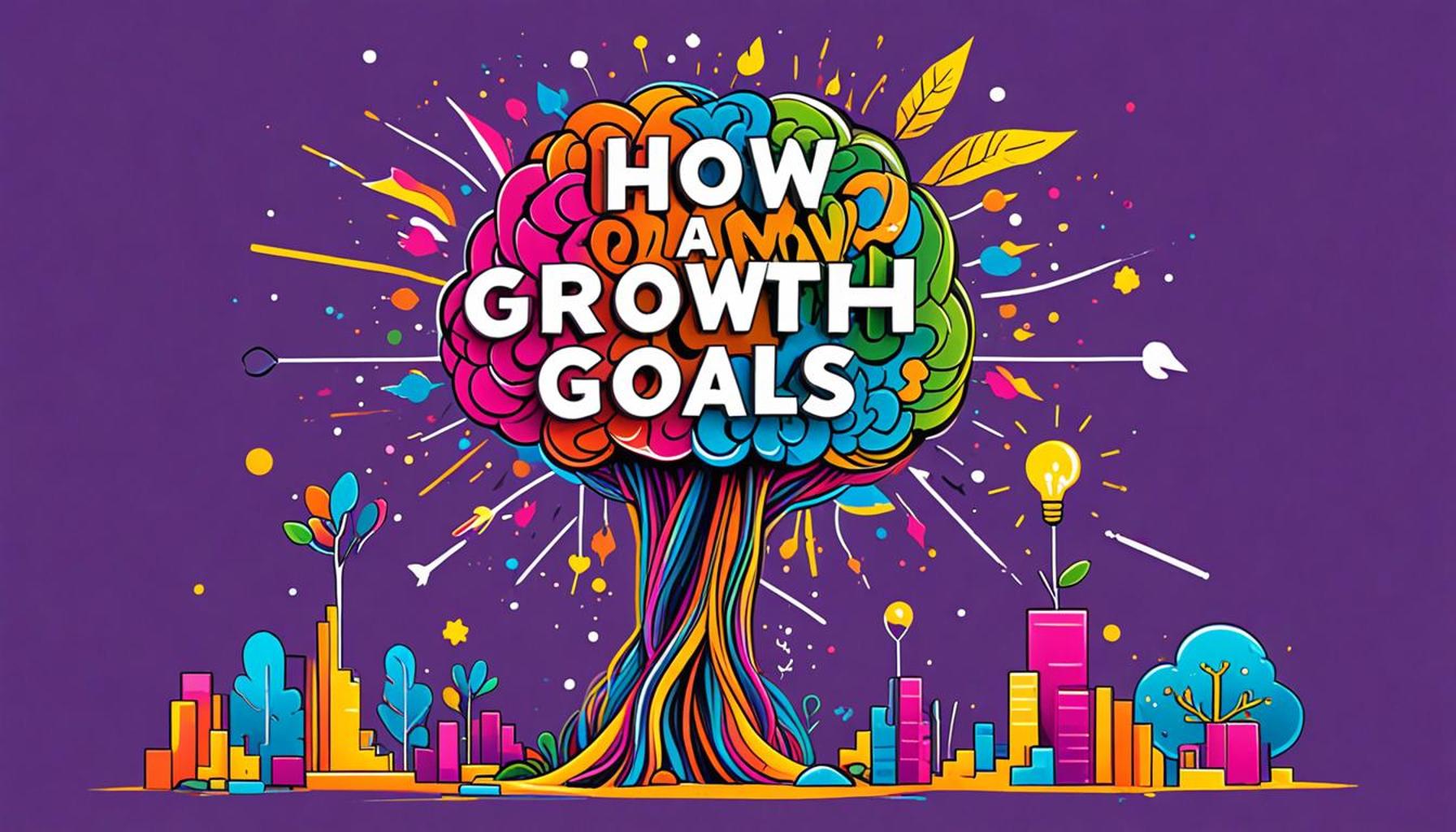Master SMART Goals for Growth Mindset Unlock Success Now

Setting the Stage for Success
Defining SMART goals plays a pivotal role in embracing and nurturing a growth mindset. These goals provide a structured framework that transforms aspirations into actionable steps, propelling individuals towards success. By honing in on Specific, Measurable, Achievable, Relevant, and Time-bound targets, individuals can effectively track their progress while cultivating resilience and adaptability.
Why SMART Goals Matter
Understanding the impact of SMART goals within the context of a growth mindset opens avenues for personal and professional development. Here are key reasons why they are essential:
- Clarity: Define clear objectives that remove ambiguity.
- Focus: Prioritize efforts and resources towards what truly matters.
- Motivation: Maintain drive and enthusiasm by celebrating small wins along the way.
As you explore this article, get ready to discover the Top 5 strategies to master SMART goals for a growth mindset. These insights will empower you to unlock your potential and foster lasting success in various endeavors.
LEARN MORE: This related article may interest you
Top 5: The Importance of Setting SMART Goals to Cultivate a Growth Mindset
In the rapidly evolving landscape of personal and professional growth, one concept has prominently emerged as a beacon of potential: the growth mindset. Originating from the pioneering work of psychologist Carol Dweck, this mindset champions the belief that intellectual and personal capabilities are not static but can be expanded through commitment and resilience. In this quest for continuous improvement, the role of goal setting becomes paramount. Enter SMART goals—an acronym that embodies goals that are Specific, Measurable, Achievable, Relevant, and Time-bound. These well-structured goals are instrumental in fostering a growth mindset. This article delves into the top five reasons why SMART goals are vital to cultivating a growth mindset, commencing with the fifth reason and crescendoing to the paramount first reason.

5. Clarity in Direction
Embarking on a journey of self-development and growth without a clear destination is akin to wandering through a labyrinth without a map. By establishing SMART goals, individuals gain a compass that provides clear direction. A specific goal transforms nebulous aspirations into concrete targets, offering a defined path that guides individuals amid a multitude of distractions and competing priorities. Consider the example of a person aspiring to improve their physical health. Instead of aimlessly stating the desire to “get fit,” a SMART goal such as “lose 10 pounds in three months by attending the gym three times a week” casts a defined trajectory, enabling focused and purposeful action. The increased clarity eliminates ambiguity, ensuring that efforts are channelled towards meaningful pursuits.
4. Measurable Progress
Incorporating measurability into goals is akin to installing milestones along a road; they indicate progress and triumphs along the way. SMART goals infuse objective measurability into aspirations, providing a lens through which individuals can track progress. Imagine a writer aiming to finish a novel. By setting a measurable goal, such as “write 500 words every day for three months,” the measurable attribute acts as a metric for progress, offering tangible evidence of achievement through word count, chapters completed, or daily writing logs. These quantifiable checkpoints dispel discouragement associated with indistinct expectations, allowing for the recalibration of strategies and reinvigoration of motivation as targets are realised. Furthermore, breaking these larger goals into smaller, more achievable milestones nurtures a growth mindset, encouraging individuals to celebrate incremental successes that cumulatively lead to grander achievements.
3. Realistic Challenges
While unbridled ambition can ignite the fires of motivation, setting objectives that are not within the realm of possibility can quickly snuff out the sparks of enthusiasm. SMART goals encourage individuals to pursue stretching yet achievable challenges. This balance is essential to nurturing resilience—a cornerstone of the growth mindset. For instance, envision an employee aiming for a promotion. Setting a realistic yet challenging goal, such as “learn and practise three new software skills in the next six months,” ensures that the individual’s efforts are directed toward attainable growth, reducing the potential for disillusionment. This systematic approach fosters an environment where perseverance and adaptability thrive, enabling individuals to learn from setbacks and view them as stepping stones rather than obstacles. This parallels the growth mindset’s axiom: “Mistakes are portals of discovery.”
2. Relevance to Personal Values
The alignment of goals with personal values and beliefs is the emotional catalyst that fuels unwavering commitment. SMART goals underscore the importance of relevance by ensuring that objectives are rooted in the individual’s core values and long-term aspirations. Consider an entrepreneur intent on launching a sustainable business. By aligning goals such as “develop a product using 100% recycled materials within the next year,” personal values resonate within the goal, fostering intrinsic motivation that fortifies resolve. This profound connection between objectives and values heightens willingness to navigate obstacles, firmly anchoring the belief that consistent effort leads to meaningful success. The amalgamation of goals with personal ethos propels the growth mindset, cementing trust in the ability to evolve through dedication.
1. Timely Framework for Accountability
In the absence of deadlines, goals often languish in perpetual inertia. The time-bound element of SMART goals injects urgency and accountability into the pursuit of aspirations. By establishing a timeline, whether short-term or long-term, urgency compels individuals to prioritise their actions and organise their schedules effectively. The act of setting deadlines transforms daunting, large-scale ambitions into digestible, actionable steps. Consider a student with the ambition of acing a semester. Setting a time-bound goal like “attend study groups every fortnight and complete assigned readings weekly” instils discipline and focus, thus incentivising progress and establishing a rhythm for success. Embracing these elements of timeliness not only enhances productivity but also fortifies the growth mindset, making it possible for learners to continually challenge and realise their fullest potential.
In summary, the art of formulating SMART goals extends far beyond traditional goal setting, acting as a powerful catalyst for cultivating a growth mindset. From offering clarity in direction to embedding a timely framework for accountability, SMART goals are indispensable in navigating the complex terrain of personal development. Embracing this structured approach ultimately empowers individuals to unlock their potential, transforming challenges into opportunities for growth, and embarking on a journey of lifelong self-improvement. Whether you are a student, a professional, or anyone in between, setting SMART goals is a potent tool for those seeking to cultivate resilience, adaptability, and a robust growth mindset.
| Category | Details |
|---|---|
| Specific Goals | Setting clear and specific objectives helps individuals understand exactly what is expected of them, providing clarity and direction, which is crucial for growth. |
| Measurable Outcomes | Measuring progress through various metrics allows individuals to track their journey and make informed adjustments to their strategies as necessary. |
| Achievable Targets | Setting achievable targets ensures that goals are realistic and can be completed, enhancing motivation and preventing discouragement that often arises from unattainable ambitions. |
| Relevance | Goals must align with broader aspirations, reinforcing the individual’s commitment and enhancing their personal growth journey, making each step meaningful. |
| Time-Bound Objectives | Establishing deadlines instills a sense of urgency and enhances the likelihood of completing goals, which in turn fosters a celebration of progress and continual growth. |
The concept of SMART goals is pivotal to the development of a growth mindset. By defining goals that are Specific, Measurable, Achievable, Relevant, and Time-Bound, individuals are equipped with a structured approach that fosters resilience and adaptability. This framework empowers them to navigate challenges with clarity, thus reinforcing the psychological foundation necessary for personal and professional development. The process of setting goals, tailored to meet individual aspirations, not only cultivates a sense of purpose but also enhances confidence as one witnesses the incremental realization of their objectives.Moreover, engaging in the practice of reflecting on these goals often leads to the discovery of new opportunities and potential pathways that might have been previously overlooked. This introspection is a vital aspect of cultivating a growth mindset, urging individuals to view setbacks as learning experiences rather than failures. The synergy between setting SMART goals and adopting a growth-oriented perspective paves the way for continuous improvement and resilience in the face of adversity. Investing time in goal-setting aligns with personal values and career ambitions, allowing for profound self-understanding and purposeful action. The precise nature of SMART goals invites individuals to articulate their vision, thereby enhancing clarity and focus. As individuals navigate their journey toward achievement, the connections between vision, action, and reflection become increasingly evident, leading to a richer, more dynamic personal growth experience.
LEARN MORE: This related article may interest you
Frequently Asked Questions About SMART Goals and Growth Mindset
What are SMART goals and how do they differ from regular goals?
SMART goals are a specific type of goal-setting framework designed to enhance clarity and trackability. The acronym SMART stands for Specific, Measurable, Achievable, Relevant, and Time-bound. Unlike regular goals, which can often be vague and open-ended, SMART goals require clear definitions and criteria to ensure they can be effectively monitored and achieved. This structured approach not only increases the likelihood of success but also encourages a stronger focus on the desired outcomes, enhancing one’s capability to cultivate a growth mindset.
Why is a growth mindset important for personal and professional development?
A growth mindset is pivotal because it emphasizes the belief that abilities and intelligence can be developed with effort and the right strategies. This mindset encourages individuals to embrace challenges, learn from criticism, and persist in the face of setbacks. According to research led by psychologist Carol Dweck, a growth mindset can lead to higher achievement levels and greater psychological well-being. Combining this mindset with SMART goal-setting can further enhance personal and professional growth by ensuring that each goal is not only aspirational but also practically attainable.
How can one ensure that a goal is both relevant and achievable?
To determine whether a goal is relevant, one must assess if it aligns with broader life objectives and values. A relevant goal should directly contribute to larger ambitions, acting as a stepping stone towards greater accomplishments. To establish the achievability, it’s essential to consider the current resources, time constraints, and skills available. Goal achievability ensures that the targets set are realistic and within reach, thereby preventing potential discouragement from overly ambitious aspirations. Ensuring these elements are in place helps foster an environment conducive to growth and continuous improvement.
What role does time management play in achieving SMART goals?
Time management is a critical component in the successful achievement of SMART goals. The time-bound aspect of SMART goals ensures that there is a specific deadline by which the goal should be accomplished. This not only prompts individuals to remain focused but also aids in prioritizing tasks effectively. Efficient time management allows for consistent progress tracking, reducing procrastination and facilitating adjustments when necessary. Ultimately, mastering time management skills can significantly enhance one’s ability to achieve set goals while maintaining a productive mindset.
CHECK OUT: Click here to explore more
Conclusion
In an ever-changing world where personal and professional growth is paramount, the concept of a Growth Mindset is a powerful driver for success. Defining SMART goals—Specific, Measurable, Achievable, Relevant, and Time-bound—is a tried-and-true method to cultivate this mindset effectively. Throughout this exploration, we’ve uncovered how these goals provide clarity and direction, enabling individuals to track progress and sustain motivation.
SMART goals create a framework that transforms vague aspirations into concrete action plans. They compel us to actively engage with our growth journey, demanding a reflective approach to skill acquisition and self-improvement. The specificity inherent in SMART goals ensures a clear focus, while measurability introduces a benchmark for progress. Achievability keeps ambitions grounded in reality, encouraging consistent effort, and relevance aligns goals with personal values and long-term objectives. Finally, by setting a timeframe, SMART goals imbue a sense of urgency and facilitate the ultimate completion of tasks.
A key takeaway is the reinforcement of accountability and persistence. As individuals embrace these principles, they inherently foster resilience and adaptability—critical components of a Growth Mindset. While challenges and setbacks are inevitable, SMART goals enable individuals to reframe obstacles as opportunities for learning and growth.
By effectively integrating SMART criteria into goal-setting practices, we don’t just enhance productivity and achievement; we unlock our potential to continuously evolve. Thus, embracing SMART goals is not just a tactical approach but a strategic investment in a mindset that propels perpetual development and success. The journey towards cultivating a robust Growth Mindset starts with a simple yet powerful decision: to set SMART goals and embark on a transformative personal development path.
The significance and applicability of this approach remain undoubtable; however, proactively adopting it is where the true transformation lies. Such a commitment to growth can lead us to explore new horizons and achieve targets once thought out of reach.



